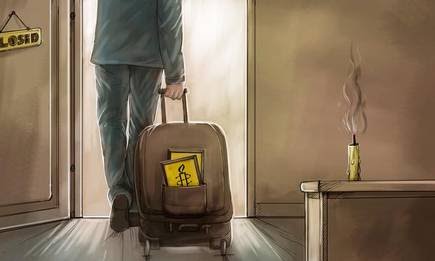Zainab Ashraf. Siyasat.net
Peter Benenson, the founder of Amnesty International (AI), set-up this organisation in London, United Kingdom in July 1961 with an aim to help those who are executed, imprisoned and are tortured by the government because of their political or religious views. Now the organisation is working in more than 150 countries including Pakistan, China, Turkey and a few days back in India as well.
In India, the organisation was working on many sensitive issues like demanding justice for the human rights abuses in Jammu and Kashmir, raising awareness about the social activists who are detained and are tortured, fighting for the land rights of tribals who have been forcibly displaced by the large corporates for mining minerals or constructing dams.
Why was it targeted?
There are two recent investigations on the basis of which the central government decided to make organisation financially cripple. The first report has focused on human rights violations in India’s only Muslim-majority region, Kashmir. In 2019, during a hearing on human rights in South Asia, the organisation highlighted its finding on arbitrary detentions and the use of excessive force and torture in Kashmir, before the US Foreign Affairs Committee. And on the first anniversary of the revocation of Article 370, the organisation called for the release of all activists, journalists, political leaders and for the continuous resumption of high-speed internet services in the whole region. The second report was about Delhi riots which erupted in February and in which more than 50 people were killed, mostly Muslims and around 200 got injured. As per the report of the organisation, the Delhi police was involved in the violence.
Soon after the release of these two reports, the Indian enforcement directorate, an agency that investigates economic crimes, froze the accounts of Amnesty’s Indian branch that too without any prior notice on 10th September. The organisation has had to cease all its operations immediately and in just one day, close to 150 employees lost their jobs, adding more surplus labour in the already overflowing pool of it.
Amnesty’s senior director of research, advocacy and policy, Rajat Khosla told the BBC: “We are facing a rather unprecedented situation in India. Amnesty International India has been facing an onslaught of attacks, bullying and harassment by the government in a very systematic manner. He added, “This is all down to the human rights work that we were doing and the government not wanting to answer questions we raised, whether it’s in terms of our investigations into the Delhi riots, or the silencing of voices in Jammu and Kashmir.”
AI is a Non-Profit Organization (NGO), it is solely dependent on donations to continue its work. Being an international organisation, it has received funds from abroad as well. But now, it is blamed for misusing those foreign funds for illegal, anti-Indian activities and for converting people into Christianity. Thus, violating the laws of Foreign Contribution Regulations Act (FCRA).
FCRA and Amnesty
Under FCRA, a foreign body has to abide by the rules of RBI when it wants to purchase any capital assets in India. The NGOs registered under it, must mention where they are sourcing the money from, how much and what the money will be used for. Most importantly, the foreign contributions cannot be accepted by someone standing for elections, public servants or correspondents in newspapers. If the organisation is not registered still it can get funds by getting prior permission from the government.
But on 23rd September, FCRA, Bill, 2020 was passed in both Houses of Parliament. The bill proposed four major changes: first, it restrict any FCRA organisation to share the money with other organisations whether the latter is registered under FCRA or not; second, it restrict administrative expenses to 2%; third, it made compulsory for every FCRA organisation to have their FCRA bank account in a single Delhi branch of SBI and fourth, it enhances the power of the investigative officers and government officials in the name of time for inquiry.
The ministry of home affairs was asking AI to register itself under FCRA, however, AI declined to do so because the organisation believes that FCRA is “much abused” by the government and works to “curb the freedom of expressions of NGOs”.
As per the report published in Mint, the former Amnesty employees said that the ruling regime wants to stifle dissenting voices. But they add, the idea is not new, the road towards it was laid long before the Bharatiya Janata Party-led government came to power in 2014. Shailesh Rai, director at Amnesty International India until 2019 said, “All the laws used against dissent today—from the Unlawful Activities (Prevention) Act to the FCRA—are the legacies of the previous (Congress-led) government,”.
Previous attacks on Amnesty International
This is not the first time when AI has been targeted. In 2009, AI suspended its work because the organisation’s license to receive funds from overseas was repeatedly getting rejected by Congress-led government.
In August 2016, a case of sedition was filed against AI over allegations that anti-India slogans were raised at one of its events. Three years later, a court ordered the charges to be dropped.
In October 2018, AI’s offices in Bengaluru were raided by the Enforcement Directorate. Its accounts were frozen at that time too, but it managed to access them after seeking court’s intervention.
In 2019, AI’s small donators received letters from the country’s income tax department and later in the same year, its offices were raided again, but this time by the Central Bureau of Investigation, based on a case registered by India’s home affairs ministry.
But 2020 action has completely halted the functioning of AI. The organisation in its official statement said, “Tuesday’s announcement puts India in the same category as authoritarian regimes such as Russia, the only other country where Amnesty International previously ceased operations when it shuttered its office in 2016.”
Other organisations are next in line
The amendment in the FCRA will hamper the functioning of small NGOs who are financially dependent on big FCRA- registered NGOs. As per the Indian government data, there are more than 20,000 NGOs, registered under FCRA. They have worked for years with smaller organisations, especially in rural areas, from health care to safeguarding women’s rights. Some of these small organisations have not registered themselves under the FCRA, hence, this change will “clip their wings and disallow them to continue with their good work.”- Charities Aid Foundation India (CAFI).
Greenpeace India, another international organisation, is the next target after AI. It has been investigating by the Enforcement Directorate since 2018. The organisation was forced to reduce its staff by a third and scale back its work on climate change.
The chief executive of Oxfam India, Amitabh Behar said, ““Every successive government has had a deep suspicion and distrust of the civil society organization,” he further added, “Earlier, the relationship was that (the state says) you survive and we will try to monitor, regulate, and sometimes use the bureaucracy and the state apparatus against you. Now it’s more like, fall in line or we won’t let you exist. If you are running a hospital, orphanage or giving things to the poor, it’s okay. But you can’t get into holding power to account.”
AI vs the Indian government
The organisation has blamed the ministry of home affairs, supported by the Hindu Nationalist Party, BJP led by the current Prime Minster of India, Narendra Modi for “incessant witch-hunt of human rights organisations” by India’s government “over unfounded and motivated allegations,” and that the group’s “lawful fundraising model” was being portrayed as money laundering because it has challenged the “government’s grave inactions and excesses.”
In response to this, the government of India said in a statement that the accusations were “unfortunate, exaggerated and far from the truth”.
Khosla said, “I hope people around the world sit up and take notice. We are doing this with a very heavy heart, and a deep sense of anguish and grief. He added, “The group, which operates in more than 70 countries, will continue to fight its legal cases in India.” (www.siyasat.net is Ahmedabad,Gujarat, India based website. The writer is Delhi based freelance journalist. Views are personal)































